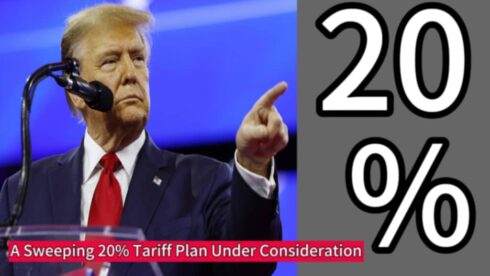Donald Trump’s inner circle is deliberating a seismic shift in U.S. trade policy—global tariffs of up to 20% that could impact nearly all trading partners. According to the Wall Street Journal, these sweeping tariffs, if enacted, would mark one of the most aggressive trade moves in modern history. This proposal is reportedly part of Trump’s broader economic vision, aiming to bolster American industry while challenging foreign competitors.
Trump’s proposed tariffs could escalate tensions with key allies and economic powerhouses, including the European Union, Canada, and China. Such a move could trigger retaliatory measures, destabilizing global markets and supply chains. Economic analysts warn that while this strategy may benefit select U.S. industries in the short term, it could also provoke inflation and hinder global economic cooperation.
A Protectionist Warpath: Trump’s ‘America First’ Doctrine Intensifies
Donald Trump has long championed an aggressive “America First” economic policy, and these prospective tariffs fit squarely within that framework. His administration previously imposed targeted tariffs on steel, aluminum, and Chinese imports, setting the stage for a trade war that rattled markets during his first term. Now, with a sweeping 20% tariff plan under consideration, Trump is signaling an unprecedented escalation in his protectionist approach.
If enacted, this move would fundamentally alter global trade dynamics, increasing costs for U.S. businesses reliant on imported goods. Critics argue that such an approach risks alienating allies and could lead to a new era of trade isolationism. However, Trump’s supporters maintain that these tariffs are a necessary tool to pressure foreign nations into fairer trade agreements and to reinvigorate domestic manufacturing.
Global Markets on Edge as Trade Tensions Mount
Donald Trump’s tariff proposal has sent shockwaves through global markets, with investors bracing for potential economic turmoil. Stock markets responded with volatility amid fears that broad-based tariffs could slow economic growth and trigger retaliatory actions from major trading partners. The prospect of widespread tariffs has already fueled speculation of a new trade war, reminiscent of the U.S.-China confrontation during Trump’s first term.
Financial analysts caution that such a move could drive up costs for American consumers and businesses, leading to inflationary pressures. Moreover, industries reliant on international supply chains, such as technology and automotive sectors, could face significant disruptions. While Trump’s economic advisors argue that tariffs could generate revenue and promote domestic production, critics warn of unintended consequences that could stifle global economic stability.
China, Europe, and Canada Prepare for Retaliation
Donald Trump’s tariff plan has already drawn sharp responses from global economic leaders, with China, the European Union, and Canada reportedly drafting countermeasures. Beijing has previously retaliated against Trump’s tariffs with levies on American agricultural products, and analysts predict a similar response if new tariffs are imposed. The European Union, a longtime U.S. trade ally, has also hinted at potential countermeasures, raising concerns about a prolonged economic standoff.
Canada, one of America’s largest trading partners, could also take a hardline stance, particularly given past disputes over aluminum and steel tariffs. If retaliatory tariffs are implemented, U.S. exporters could face declining sales abroad, affecting sectors such as agriculture, automotive, and technology. The looming prospect of a full-scale trade war underscores the geopolitical and economic stakes involved in Trump’s aggressive tariff strategy.
Domestic Divisions: U.S. Businesses and Lawmakers React
Donald Trump’s sweeping tariff proposal has sparked fierce debate within the United States, with business leaders and lawmakers sharply divided. The Chamber of Commerce and various industry groups have voiced concerns over potential cost increases, warning that broad tariffs could hurt American consumers and small businesses. Large multinational corporations reliant on global supply chains have also expressed alarm over the economic ramifications.
Meanwhile, Republican lawmakers appear split, with some backing Trump’s hardline trade stance while others caution against the risks of escalating global tensions. Democratic leaders have criticized the proposal as a reckless move that could lead to job losses and economic uncertainty. Trump’s tariff strategy is poised to become a defining issue, shaping both domestic policy and international relations.
The Road Ahead: Will Trump’s Tariff Gamble Pay Off?
Donald Trump’s consideration of global tariffs marks a high-stakes gamble that could redefine the global economic order. Proponents argue that such measures will incentivize domestic manufacturing, reduce reliance on foreign production, and strengthen the U.S. economy. However, critics warn of potential economic fallout, including inflation, supply chain disruptions, and retaliatory trade wars.
Whether this strategy proves to be an economic masterstroke or a costly miscalculation remains to be seen. One thing is certain: Trump’s aggressive trade policy will keep the world on edge, with far-reaching implications for the future of global commerce.














